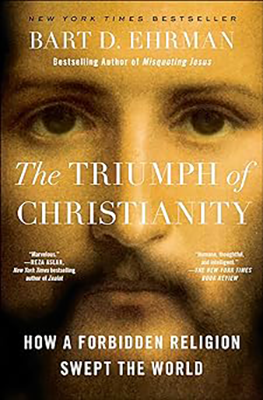The Triumph of Christianity
“The Triumph of Christianity: How a Forbidden Religion Swept the World” is a book by Bart D. Ehrman, published in 2018. In this work, Ehrman explores the rise of Christianity from its humble origins as a small Jewish sect to becoming the dominant religion of the Roman Empire. Here’s a summary:
Main Themes:
Historical Context: Ehrman provides a comprehensive overview of the historical, social, and cultural context of the Roman Empire in the first few centuries CE. He examines the religious landscape of the ancient Mediterranean world, including the diversity of pagan religions and philosophical movements that existed alongside Judaism.
Origins of Christianity: Ehrman traces the origins of Christianity to the teachings and ministry of Jesus of Nazareth in 1st-century Judea. He explores the early development of the Christian movement, including the role of Jesus’s disciples, the growth of Christian communities, and the spread of the gospel message throughout the Roman Empire.
Spread of the Faith: Ehrman examines the factors that contributed to the rapid spread of Christianity in the ancient world, including social networks, missionary efforts, and Roman infrastructure such as roads and trade routes. He discusses the appeal of Christianity to diverse audiences, including Jews, Greeks, Romans, and slaves.
Challenges and Persecutions: Ehrman explores the challenges faced by early Christians, including persecution by Roman authorities and hostility from Jewish leaders. He examines the various reasons why Christians were persecuted, including their refusal to worship the Roman gods and their perceived threat to social order.
Conversion of Constantine: Ehrman discusses the conversion of the Roman Emperor Constantine to Christianity and its implications for the future of the religion. He examines the Edict of Milan in 313 CE, which legalized Christianity, and the subsequent rise of Christianity as the official religion of the Roman Empire under Constantine and his successors.
Key Concepts:
– Religious Pluralism: Ehrman explores the religious diversity of the Roman Empire and the competition between different religious traditions for followers and influence. He examines how Christianity emerged as a distinct and influential religious movement within this pluralistic context.
– Martyrdom and Persecution: Ehrman discusses the phenomenon of Christian martyrdom and its significance in shaping early Christian identity. He examines the stories of martyrs and their impact on the spread of Christianity, as well as the role of persecution in strengthening Christian communities.
– Constantinian Shift: Ehrman analyzes the transformation of Christianity from a persecuted minority religion to the state religion of the Roman Empire. He explores the implications of this shift for the relationship between church and state, as well as for the development of Christian doctrine and institutions.
Legacy:
“The Triumph of Christianity” offers a compelling narrative of the rise of Christianity in the ancient world, drawing on historical research and scholarly analysis to illuminate key developments and themes. Ehrman’s exploration of the triumph of Christianity sheds light on the complex interactions between religion, politics, and society in the Roman Empire and continues to influence scholarship on early Christianity.

